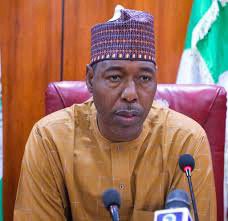Governor Babagana Zulum of Borno State has reignited a national debate over internal sabotage in Nigeria’s prolonged fight against Boko Haram, as reported by vanguard.
His recent statements point to a troubling reality: the country’s security architecture is compromised by insiders aiding the enemy.
Zulum disclosed that informants exist within the Nigerian Armed Forces, political class, and even among local communities, enabling Boko Haram to outmaneuver security efforts. The governor’s remarks follow a deadly attack in Marte that displaced over 20,000 residents and rendered most of the local government uninhabitable.
This revelation echoes a stark warning from former President Goodluck Jonathan in 2012, when he said sympathizers of Boko Haram had infiltrated the executive, legislature, and judiciary.
Despite the alarm, little was done to expose or prosecute those involved, allowing the insurgency to deepen.
According to Amnesty International, more than 36,000 people have died due to insurgency-related violence, with over two million internally displaced.
Once confined to the North-East, insecurity now affects states such as Benue, Plateau, Zamfara, Sokoto, and Niger.
Dr. Sam Amadi, Director of the Abuja School of Social and Political Thoughts, explained that the Nigerian state suffers from inefficiency and is often influenced by ethnic and religious interests, which protect saboteurs from accountability. He warned that without autonomy and internal coherence, the state remains vulnerable to infiltration.
Policy lawyer Dr. Evans Ufeli recounted disturbing instances of soldiers caught aiding insurgents, emphasizing that political actors often exploit the crisis for selfish gain. He questioned why known sponsors have not been publicly named or prosecuted, stating, “The government must go beyond rhetoric.”
Debo Ologunagba, spokesperson for the People’s Democratic Party, argued that the current administration has failed in its constitutional duty to secure citizens. He described the spread of violence under the APC as “a cancer,” urging decisive reforms and better collaboration.
The growing frustration among Nigerians is palpable. Citizens are demanding accountability, transparent investigations, and a complete overhaul of intelligence and military vetting processes.
Zulum’s comments serve as both a warning and a challenge.
Unless Nigeria roots out traitors within, no amount of military hardware will win the war. The fight against terrorism must begin from within, where betrayal continues to weaken the country from the inside.
Love Reading Authentic News Stories, Click The Button Below

